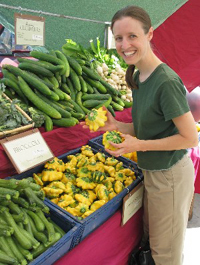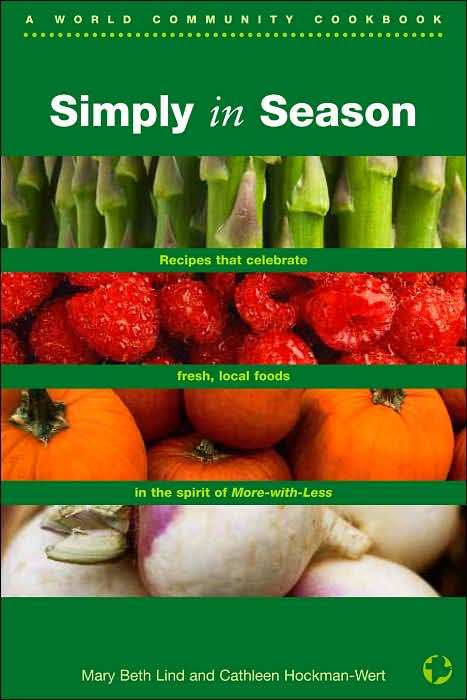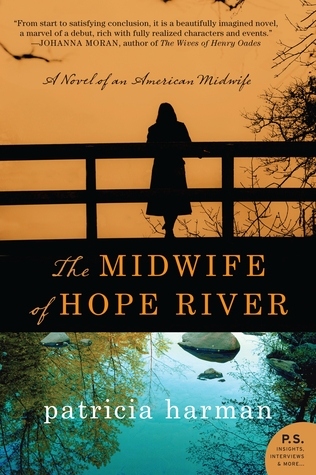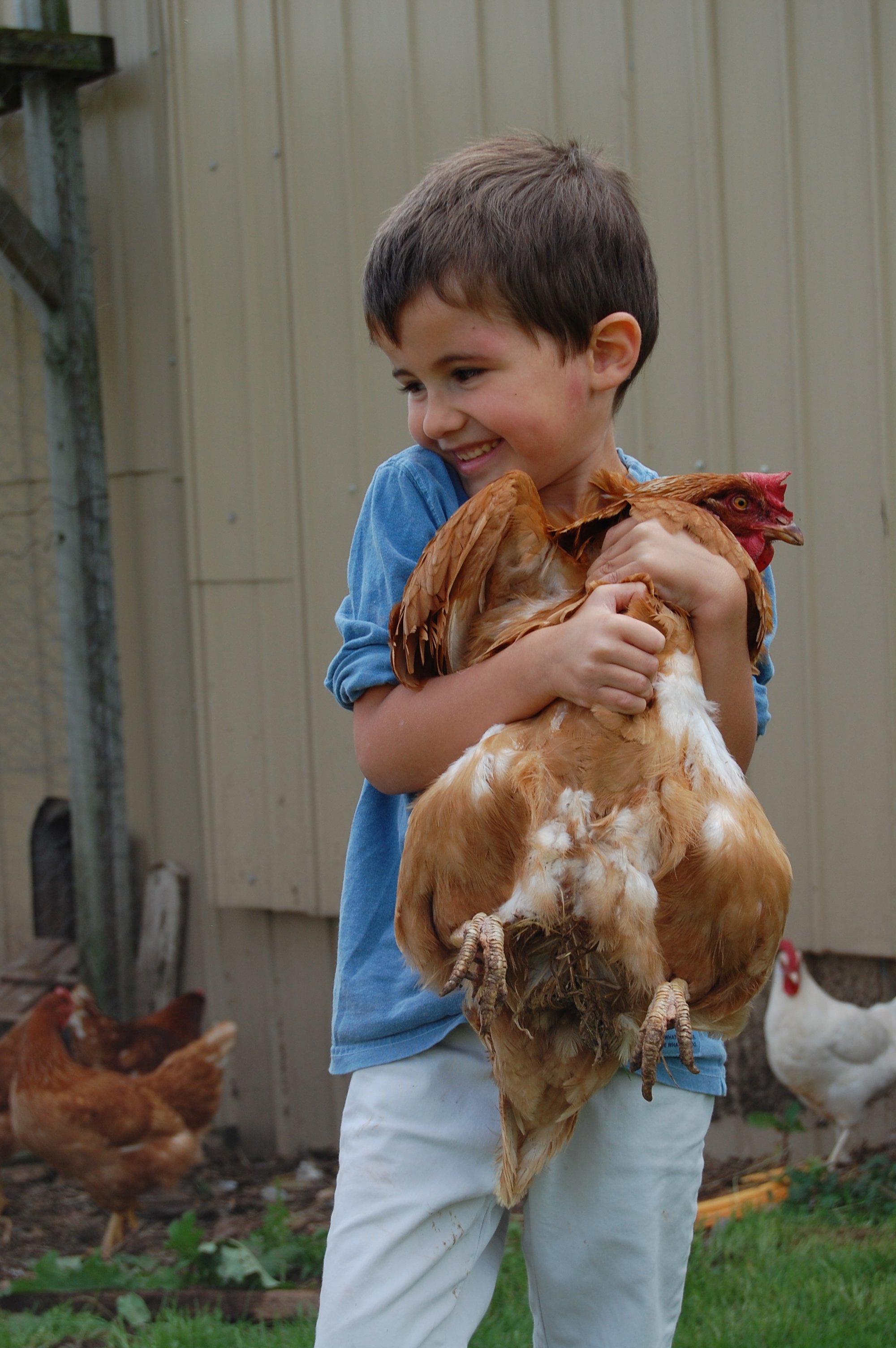I’m delighted to welcome to the blog today Cathleen Hockman-Wert, the co-author of Simply in Season, one of my favorite cookbooks!
 It’s always a pleasure to connect with people who share my interest in good food, food that is good in every way: food that tastes good, food that is good for our health, good for the environment, good for local communities and good for people worldwide.
It’s always a pleasure to connect with people who share my interest in good food, food that is good in every way: food that tastes good, food that is good for our health, good for the environment, good for local communities and good for people worldwide.
Rachel asked me to share a little about the story behind Simply in Season, a cookbook that I co-authored with Mary Beth Lind to celebrate good food. It encourages people to choose seasonal, locally-produced and fairly traded foods, with an emphasis on fresh fruits and vegetables.
Simply in Season is the third in a series of cookbooks produced by the international relief and development organization, Mennonite Central Committee (MCC). The first, More-with-Less Cookbook by Doris Janzen Longacre, was first published in 1976. This was a time when global food shortages loomed, and in response MCC asked its constituents to eat and spend 10 percent less on food. More-with-Less explained how to do that – to eat less meat and more rice and beans, for example – but even more importantly made a persuasive argument: that faith and food are deeply connected. And that, moreover, eating more simply was not about “cutting back.” Rather, it meant “living joyfully, richly, creatively.”
Fast forward 30 years.
I grew up with More-with-Less, and it strongly influenced my values. I believed that “eating justly” meant two primary stewardship issues: health and cost. I wanted food that was good for me, and cheap. The intention was that by spending less on food, I would have more to share with others.
 Frugality is part of my Mennonite DNA; my people tend to believe thriftiness could give cleanliness some solid competition for that place next to godliness. But my perspective was also shaped by broader culture. Compared to other nations, we Americans don’t spend much on what we eat, and we like it that way. We feel entitled to cheap food.
Frugality is part of my Mennonite DNA; my people tend to believe thriftiness could give cleanliness some solid competition for that place next to godliness. But my perspective was also shaped by broader culture. Compared to other nations, we Americans don’t spend much on what we eat, and we like it that way. We feel entitled to cheap food.
My perspective began to change as I learned more about the stories behind my food and realized that as a consumer with purchasing power, I am a part of these stories. One tomato might look like another, but because of the way they are produced, they may have wildly different stories in terms of economic justice, environmental impact, and so on. The stories are in fact so different that I came to see that food choices are not morally neutral.
When I choose which tomato to buy, this action has ramifications beyond my own pocketbook. It takes place in the context of a community, human and nonhuman. I am participating in systems that make life better for others, or worse. Grocery shopping is in fact an exercise in ethics. {a well-worn page from More-with-Less}
{a well-worn page from More-with-Less}
In Simply in Season I wanted to continue the conversation that began in More-with-Less about faith and food, and how our everyday actions reflect our values.
I still value frugality! But now my view is a little more holistic. A truly frugal outlook has a long view. Even the most devout penny-pinchers know it doesn’t save money to buy something cheap if it’s so flimsy it will have to be quickly replaced; it’s better to spend more at the outset and use it for a long time. In a wider sense, likewise, a frugal approach to grocery shopping – to any shopping, really – takes into account the hidden costs: the costs of cleaning up our environment, the health care costs for farmworkers sickened by pesticides, the military costs of protecting access to cheap oil. And our Christian calling to care for “the least of these” makes us ask, who is bearing the real costs?
It isn’t always easy to move from “spend less” to “spend for a better world.” When I shop, sometimes I repeat a little mantra: “cheaper is not always better.” I also like to repeat a prayer from Blessed Be Our Table, a collection of graces from the Iona Community: “Let me not seek a bargain that leaves others hungry.”
I’ve found it helpful, too, to view eating/shopping as a spiritual discipline. To me this reflects several things. First, as with the discipline of charitable giving, there’s an economic impact: choosing good foods can cost more. Equally significant is the impact on time. Amidst busy schedules, it can be hard to find the time to buy and prepare fresh food. Framing this practice as a spiritual discipline honors that reality. Spending time in worship or prayer requires making these things a priority. So does cooking a meal.
Finally, seeing food choices as a spiritual discipline speaks to their ordinariness, their daily nature. In contrast to a big decision like buying an electric car or choosing a house within biking distance of work, choices about food are small, and we make them constantly. We might make one choice today and a different choice tomorrow, but there’s always another chance to move toward greater consistency in matching our values with our actions.
A spiritual “practice” speaks to both the noun and verb meanings of “practice”: it’s an enactment of our beliefs as well as something we’re working on – like practicing the piano. We do it over and over again and get better.
I hope that idea is helpful for people when they ask about how they can afford to choose good food. Each of us has a different situation. Choose a place to start: maybe one local meal per week, or switching from regular to fair trade coffee. After a while, change something else.
Practice.
Like our spiritual journeys themselves, this journey with good food choices is gradual, partial, imperfect, and ongoing. And ultimately, I believe, that is good news indeed.
{thank you, Cathleen! It’s a pleasure to have you at Eat With Joy today!}












